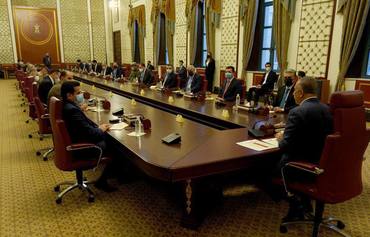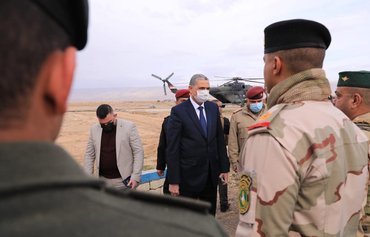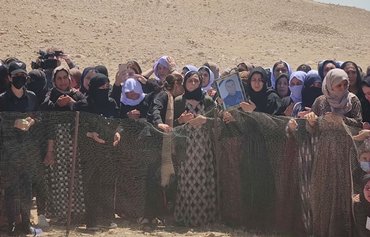Iran-backed Iraqi militias have been obstructing an agreement between the Iraqi government and the autonomous Kurdish region on the status of western Ninawa's Sinjar district by failing to withdraw from the area, local officials said.
The agreement, endorsed October 9th, sets out mutual understandings regarding security, civil administration, reconstruction and the return of internally displaced persons (IDPs).
Under the terms of the deal, the federal government and the Kurdish authority are to form a joint administration in Sinjar, with federal forces overseeing security, in co-operation with Kurdish forces.
All armed groups are to withdraw from the area, per the deal, including the Popular Mobilisation Forces (PMF). But the militias have thus far refused to leave their positions and withdraw from the district.
![Iraqi Minister of Migration Evan Faeq Jabro speaks with displaced Yazidi women in a displacement camp in northern Iraq on July 27th. [Photo courtesy of the Iraqi Ministry of Migration and Displacement]](/cnmi_di/images/2020/11/23/27086-Iraq-IDP-camp-600_384.jpg)
Iraqi Minister of Migration Evan Faeq Jabro speaks with displaced Yazidi women in a displacement camp in northern Iraq on July 27th. [Photo courtesy of the Iraqi Ministry of Migration and Displacement]
This failure to comply flies in the face of the Iraqi government's willingness to demonstrate its commitment to implementing the agreement and resolving all outstanding issues in the Kurdish region, officials said.
During a November 15th meeting in Baghdad with a delegation from Sinjar, Iraqi Prime Minister Mustafa Kadhemi confirmed his government's commitment to finding solutions to the district's problems.
"The solution has to emerge internally rather than from external parties," he said, noting that "the law is sufficient to build the foundations of a strong state... that fosters religious and ethnic diversity".
This diversity "we consider a factor of strength instead of a weakness", he said.
President of the Kurdish regional government Nechirvan Barzani also stressed his determination to implement the Sinjar agreement, noting that it serves "all Iraqi components".
Militias rejected Sinjar agreement
In recent years, observers told Diyaruna, the militias have exploited political differences between the federal government and the Kurdish region to expand their influence in the district.
"There are at least 15,000 militia fighters deployed in Sinjar," said Sheikh Muzahim al-Huweit, a tribal spokesman in Ninawa.
They are distributed among about 17 armed factions linked to Iran, among them Kataib Hizbullah, Asaib Ahl al-Haq, Harakat al-Nujaba, Badr Organisation, Sayyid al-Shuhada Brigades and Imam Ali Brigades, he told Diyaruna.
"Kataib Hizbullah and other militias declared their rejection of the Sinjar agreement and sought to obstruct its implementation and ignore its provisions," al-Huweit said.
Iran's Islamic Revolutionary Guard Corps (IRGC) even maintains a headquarters in Mount Sinjar to oversee the militias' activities, he said, noting that the militias are a "major stumbling block" to normalising the situation and ensuring stability.
He accused the militias of operating "secret prisons" and persecuting the Arab tribes living in western Sinjar and the few Yazidis who returned to the district.
Sinjar is of strategic importance to Iran and its proxies due to its geographical location, Iraqi journalist and political analyst Ziad al-Sinjari told Diyaruna.
The district borders Syria to the west and is thus considered an outlet for the transfer of fighters and weapons and for smuggling activities that generate funds, he said.
Conditions 'abysmal' in Sinjar district
The militias that rejected the Sinjar agreement are still attempting to prevent any normalisation, al-Sinjari said.
As a result, conditions in the district continue to be abysmal, he added, noting that many areas liberated from ISIS have been taken over by militias and turned into military bases -- as was the case in Jurf al-Sakhr, south of Baghdad.
He noted that the residents of Sinjar, who were slaughtered, imprisoned, enslaved or displaced by ISIS, are now facing the militias' control of their areas, which prevents them from returning out of fear they will be targeted.
"The Sinjar agreement revived hopes of putting an end to the Yazidis' suffering, most of whom currently live in IDP camps in the Kurdish region," said the head of the Yazidi Organisation for Documentation, Hussam Abdullah.
They are estimated to total 300,000, he told Diyaruna.
"The multiple forces currently deployed in the Sinjar district, in addition to the threats that ISIS remnants still pose, are among the main obstacles to the return of the displaced population," he noted.
He stressed that if it can proceed without obstruction, the agreement would encourage the people to end their displacement and help to provide security and stability in the administrative district.
He proposed setting specific timelines for the implementation of all the provisions stipulated in the agreement.

![Iraq's Prime Minister Mustafa Kadhemi meets with representatives from Sinjar district on November 15th. [Photo courtesy of the Prime Minister's Office]](/cnmi_di/images/2020/11/23/27085-Iraq-Kadhemi-Sinjar-600_384.jpg)






